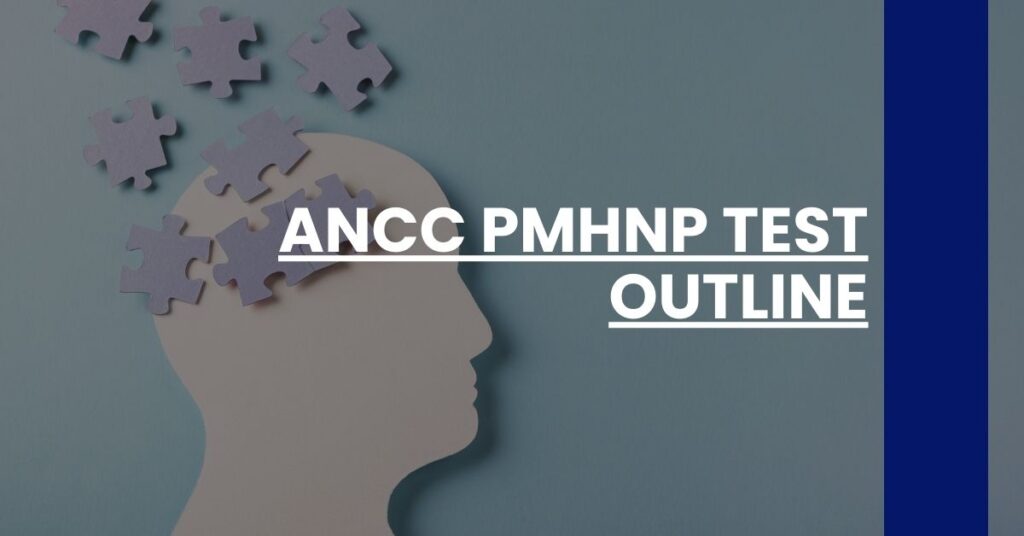The ANCC PMHNP test outline is your roadmap to certification success.
- Understanding the Test: Grasping the structure of the ANCC PMHNP exam ensures a targeted study approach.
- Content Domains: Knowing the key content areas helps prioritize learning efforts.
- Preparation Resources: Utilizing the right study materials can make all the difference in your performance.
Master the ANCC PMHNP test outline to boost your preparation.
- Introduction to ANCC PMHNP Certification
- Understanding the PMHNP Test Structure
- Key Content Areas of the PMHNP Exam
- Exam Preparation Strategies
- Eligibility Requirements for PMHNP Test Candidates
- Registration Process for the PMHNP Examination
- What to Expect on Test Day
- Scoring and Passing Criteria
- Maintenance and Renewal of PMHNP Certification
- Frequently Asked Questions (FAQs)
- Conclusion
Introduction to ANCC PMHNP Certification
The American Nurses Credentialing Center (ANCC) Psychiatric-Mental Health Nurse Practitioner (PMHNP) certification is a pivotal advancement for nurses diving into the specialty of mental health. This credential is not just a feather in your cap; it represents a commitment to excellence in this challenging and fulfilling field. It’s your passport to a community of professionals dedicated to the well-being of patients wrestling with psychiatric disorders and mental health issues. As someone eager to make a real difference, obtaining your ANCC PMHNP certification is a robust step toward enhancing both your competence and the quality of care you provide.
Why is ANCC Certification Critical?
- Validate your expertise: Achieving certification from the ANCC, a widely respected organization, publicly affirms your specialized knowledge and skillset in psychiatric mental health nursing.
- Expand your career horizons: A PMHNP certification can unlock doors to higher salaries, leadership roles, and greater job opportunities within diverse healthcare settings.
- Improve patient outcomes: Certified professionals are equipped with current best practices to deliver superior patient care, positively impacting lives and advancing public health in mental wellness.
Understanding the PMHNP Test Structure
Test Composition
Delving into the ANCC PMHNP test outline, the test is meticulously structured to assess a comprehensive range of competencies essential for a PMHNP. It’s a computer-based exam featuring 175 questions, which you need to answer within a 3.5-hour time frame. Out of these, 150 questions are scored, and 25 are pretest questions that do not count towards your final score but are used to develop future exams.
Question Types
The PMHNP exam encompasses multiple-choice questions, along with alternate-item format questions, such as multiple-response, hot spots, drag-and-drop, and chart exhibit items. These questions are designed to assess your practical knowledge and your ability to apply theoretical principles in real-world scenarios effectively.
Sections of the PMHNP Exam
The exam comprises diverse content domains that reflect the critical components of psychiatric-mental health practice:
- Scientific Foundation
- Advanced Practice Skills
- Psychotherapy and Related Theories
- Ethics and Legal Principles
- Healthcare Delivery Systems
These domains include subtopics that touch upon pharmacotherapeutics, neurobiology, psychopathology, and health policy, ensuring you’re tested on every aspect fundamental to mental health practice.
Key Content Areas of the PMHNP Exam
When preparing for the ANCC PMHNP exam, understanding the importance of each content area allows you to better focus your study efforts. Let’s unpack the primary content areas and their respective weights:
- Advanced Practice Skills – 27%: This area evaluates your clinical reasoning skills, from health promotion to differential diagnosis and disease management.
- Scientific Foundation – 22%: Here, your grasp of pathophysiology, advanced pharmacology, and neuropsychiatry are put to the test.
- Diagnosis and Treatment – 22%: The section delves into common psychiatric disorders and their evidence-based treatment.
- Psychotherapy and Related Therapies – 15%: This assesses your knowledge of therapeutic relationships, communication techniques, and psychotherapeutic interventions.
- Ethical and Legal Principles – 14%: You’ll need to demonstrate understanding in confidentiality, informed consent, and ethical decision-making.
These percentages are indicative of the emphasis placed on each domain within the exam, guiding your study priorities and helping you maximize your preparation effectiveness.
Exam Preparation Strategies
Embarking on a journey to conquer the PMHNP certification exam requires a strategic plan and resources attuned to your learning style. Here’s how you can triumphantly navigate your way through the study material.
Determine Your Study Style
First, pinpoint whether you’re a visual learner who benefits from charts and diagrams, an auditory learner who grasps concepts better through discussion, or kinesthetic, where interaction and hands-on approaches are key.
Build a Structured Study Schedule
Creating a timeline with a realistic, holistic study plan ensures consistent progress. Break down your study sessions ensuring coverage of all sections.
Utilize Diverse Resources
Employ a variety of study materials such as review courses, textbooks, and practice tests. Barkley & Associates, for example, offers a robust PMHNP review course that many aspirants have found beneficial.
Apply a Multi-Method Approach
Integrate active learning techniques such as:
- Mind Mapping: To visualize connections between concepts.
- Teach-Back Method: Explain topics to others to reinforce your understanding.
- Question Banks: Practice with sources like the ANCC’s Interactive Online Review Course for a true taste of the exam’s difficulty and question style.
Join Study Groups
Participating in study groups can provide mutual support and facilitate knowledge exchange, strengthening your preparation.
Eligibility Requirements for PMHNP Test Candidates
To sit for the ANCC PMHNP exam, there are specific criteria that you must meet. These prerequisites not only ensure that you have the necessary background but also impart confidence in your eligibility for the test.
- Hold a current, active RN license in a state or territory of the United States or the professional, legally recognized equivalent in another country.
- Obtain a master’s, postgraduate, or doctoral degree from a psychiatric-mental health nurse practitioner program accredited by the Commission on Collegiate Nursing Education (CCNE) or the Accreditation Commission for Education in Nursing (ACEN).
- Accumulate a minimum of 500 supervised clinical hours in the psychiatric-mental health nurse practitioner role.
- Complete coursework in advanced physiology/pathophysiology, including general principles that apply across the lifespan.
- Complete coursework in advanced health assessment, which includes assessment of all human systems, advanced assessment techniques, concepts, and approaches.
- Complete coursework in advanced pharmacology, which includes pharmacodynamics, pharmacokinetics, and pharmacotherapeutics of all broad categories of agents.
These stepping stones lay the foundation for your journey to becoming a certified PMHNP, equipping you with the credentials necessary to elevate your career and impact the mental health field positively.
Registration Process for the PMHNP Examination
When your preparation is in full swing, registering for the PMHNP examination is your next crucial step. Don’t let the logistics daunt you; the process is streamlined to help you focus on what really matters—your impending success.
Step-by-Step Guide to Registering
- Ensure your eligibility: Double-check that you meet all the criteria required to sit for the exam as previously detailed.
- Apply through ANCC: Visit the official ANCC website, where you’ll find a comprehensive application to fill out.
- Submit the required documentation: This includes proof of your degree, transcripts, and clinical practice hours, among others.
- Pay the examination fee: Payment is submitted during the application process. ANCC members enjoy a discounted rate, which highlights the benefits of joining the organization.
Upon approval, you will receive a Notice to Schedule (NTS) by email, after which you can schedule your exam through the designated testing service provider.
Reservation Deadlines and Fees
Adhering to deadlines is paramount. The ANCC has established cut-off dates which you must observe to schedule and take your test. The registration fee varies depending on whether you hold ANCC membership, so be sure to account for these differences in your budgeting.
What to Expect on Test Day
The test day is a significant milestone in your PMHNP journey, marking the culmination of your diligent preparation.
Preparation for the Big Day
- Checklist: Make a checklist of what you need to bring and do on test day. This should include the confirmation of your test appointment, required IDs, and directions to the test center.
- Arrival Time: Plan to arrive at least 30 minutes before your scheduled exam time to account for check-in procedures.
- Identification Requirements: Bring the acceptable forms of identification as outlined by the ANCC, which typically include a government-issued photo ID.
Inside the Testing Center
You will be required to adhere to certain protocols within the testing center, like storing personal belongings in a designated area and familiarizing yourself with the test station’s operations before starting your exam.
Scoring and Passing Criteria
Post-exam, candidates eagerly anticipate their results, knowing that their scores reflect the expertise they’ve worked so hard to achieve.
How the Test is Scored
The ANCC PMHNP examination is scored on a pass/fail basis. Your performance on the scored items is tallied to decide the outcome. Remember, those 25 pretest questions are unscored and are used to inform future test iterations.
Passing the Exam
A passing score is determined by the ANCC and is set based on standardized psychometric procedures. This score represents a level of competency that all PMHNPs are expected to meet. You will receive your official results within minutes of completing the exam, thanks to the computer-based testing format.
Maintenance and Renewal of PMHNP Certification
Maintaining your certification is as essential as earning it, signaling your ongoing commitment to professional excellence and up-to-date knowledge.
Renewal Process
- Continued Education: Engage in professional development activities such as workshops or further studies to accumulate the required continuing education hours.
- Professional Practice: Demonstrate a set amount of clinical practice hours in the psychiatric-mental health field.
- Application Submission: Complete the renewal application and submit it with the appropriate fee before your certification expires.
The ANCC website offers detailed guidelines on how to fulfill these requirements efficiently.
Frequently Asked Questions (FAQs)
Questions regarding the ANCC PMHNP test outline and certification process abound; let’s address some common inquiries.
Common Queries Demystified
- How often is the PMHNP certification renewal required?: Renewal of your PMHNP certification is necessary every five years to keep the credential active.
- What should I focus on during the last week before the exam?: It is often recommended to review your weakest content areas and practice relaxation techniques to mitigate test anxiety.
- Can I retake the PMHNP exam if I don’t pass?: Yes, the ANCC allows you to retest after a 60-day waiting period, ensuring you have ample time to reinforce your knowledge.
Seeking clarity on these matters eases uncertainties, allowing you to approach your certification with a composed mindset.
Conclusion
Equipped with a deep understanding of the ANCC PMHNP test outline, you are now poised to channel your efforts effectively toward success. Although the journey to achieving and maintaining your PMHNP certification might seem long, it’s paved with profound personal and professional rewards. Your expertise in psychiatric mental health nursing will not only shape your career but also significantly impact the lives of those you aim to serve. Remember, the care you will provide as a certified PMHNP is invaluable, and your dedication to mastering the ANCC PMHNP test outline is the first step in this commendable endeavor.

